KUALA LUMPUR: It is impossible to achieve a 100% self-sufficiency ratio (SSR) in Malaysia as there are certain food items that cannot be produced domestically due to several factors, said Agriculture and Food Security Minister Datuk Seri Mohamad Sabu.
These factors include economic viability of the crop, climate differences and land resource constraints, he said.
Already a subscriber? Log in
The Star Festive Promo: Get 35% OFF Digital Access
Cancel anytime. Ad-free. Unlimited access with perks.
Follow us on our official WhatsApp channel for breaking news alerts and key updates!
Thank you for your report!





